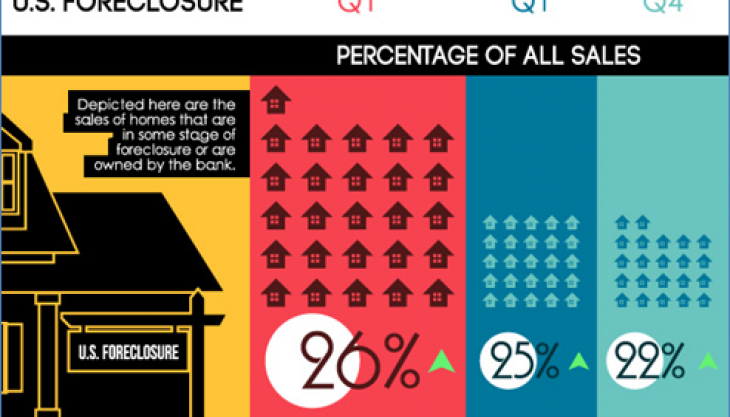What to Do When You’re Facing Imminent Foreclosure in Wake County
Submitted by Rachel R on Wed, 01/16/2013 - 4:08pm

Image source: foreclosurelistings.com
Foreclosures have become all too common since the housing bubble burst several years ago. You may be wondering if a foreclosure is on the horizon for you and what you can do about it. Luckily, there are plenty of ways to try and avoid a foreclosure, which can damage your credit history and force you to relocate. It’s important to develop a strategy, take action early, and contact a local bankruptcy attorney for advice. Here’s how to get a grip on your situation.
Payment Reality Check. The lender begins the foreclosure process after you’ve missed some number of payments. That varies by state and by lender. Even being late with one payment damages your credit history, but won’t typically trigger a foreclosure. If you’re 15 days late, you’ll probably get charged a late fee. If you’re two payments behind, you need to make those payments to get current and have your next payment accepted.
When you end up getting behind by three or more payments, you can expect that your lender will start the foreclosure process. Here’s how the process works: it starts by the lender turning the case over to a lawyer. The entire loan will become due immediately, and you’ll be liable for legal fees incurred by the lender. You’ll know for sure if foreclosure has been initiated when you receive a “notice of default” from your lender. In that letter, there will be a date by which you need to bring the loan current by making all payments due. If you can’t, the lender can auction off the home, forcing you to vacate the premises.
Prioritize Payments. If you’re facing foreclosure, you need to act fast. Catching up on mortgage payments needs to become your top priority. If you can stop making payments on other unsecured debts like credit card bills or personal loans, do that and see if you can get current with your mortgage. Yes, getting behind in those unsecured debts will damage your credit, but not as much as foreclosure – and clearly there’s a lot more at stake in losing your home.
Image source: foreclosurelistings.com
Talk to Your Lender. In reality, lenders don’t want to foreclose on your home – it’s a huge headache and is costly for them. If you’re having trouble making your mortgage payments, talk to your lender, as they may be willing to work with you to figure things out. Changing your payment date, looking for strategies to lower your payment, and offering a plan to help bring your payments current are all potential options. If you hit a snag due to a temporary problem but now have steady income, this can be a good route to pursue.
Get Help. There are many resources to help you figure out what you can do to save your home. President Obama made this a priority, so check out http://makinghomeaffordable.
Bankruptcy. If you have good income but no way to catch up on your missed payments, a Chapter 13 bankruptcy could work for you. In a Chapter 13 filing, you don’t lose any of your property. Instead, you come up with a workable plan based on your income to spread out the missed payments and get caught up over the course of three to five years. The key question to ask yourself is this: If you were current with your mortgage, would you be able to make the payments on time? If so, Chapter 13 could be an option. If you’re a small business owner, a Chapter 10 can also work in the same way, although you’re limited to a three-year plan to catch up on your debts.
As you can see, even if foreclosure is imminent, there are many avenues to explore that could help you stop the process and save your home. The key is to act fast to avoid the worst outcome. Find a local bankruptcy attorney that can help you assess your options.
Dedicated to helping residents of North Carolina find the best solutions to their debt problems. Don’t waste another day worrying about your debt. Call +1-833-627-0115 today to schedule a free initial consultation to discuss your bankruptcy options.
Debts Hurt! Got debt? Need help? Get started below!
Serving All of North Carolina
- Bankruptcy Attorneys Raleigh NC (North)
- Bankruptcy Attorney Fayetteville NC
- Bankruptcy Attorney Durham NC
- Bankruptcy Attorneys Wilson NC
- Bankruptcy Attorneys Greensboro NC
- Bankruptcy Attorneys Southport NC
- Bankruptcy Attorneys Wilmington NC
Bankruptcy Attorneys Raleigh NC (North)
6616 Six Forks Rd #203 Raleigh, NC 27615 North Carolina
Tel: (919) 847-9750

Bankruptcy Attorney Fayetteville NC
2711 Breezewood Ave Fayetteville, NC 28303 North Carolina
Tel: (910) 323-2972

Bankruptcy Attorney Durham NC
1738 Hillandale Rd Suite D Durham, NC 27705 North Carolina
Tel: (919) 286-1695


Bankruptcy Attorneys Greensboro NC
2100 W Cornwallis Dr. STE O Greensboro, NC 27408 North Carolina
Tel: (336) 542-5993

Bankruptcy Attorneys Southport NC
116 N Howe St. Suite A Southport, NC 28461 North Carolina
Tel: (910) 218-8682

Bankruptcy Attorneys Wilmington NC
116 N. Howe Street, Suite A Southport, NC 28461 North Carolina
Tel: (910) 447-2987
